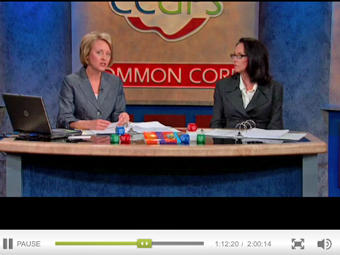
Section Branding
Header Content
Five Questions and Answers About Common Core GPS Training
Primary Content

For the past five months, we partnered with the Department of Education to deliver training on the Common Core Georgia Performance Standards through a live stream and interactive chat. (You can watch all of the archived versions here.) Why did the DOE decide to offer the training electronically, and now that it’s over, how should teachers apply it in the classroom? I turned to Susan Jacobs, English Language Arts Program Specialist K-12 for answers.
Susan Jacobs served as one of the faces of the GaDOE Common Core Professional Learning sessions, including not only the ELA sessions but the Literacy Standards presentations for Social Studies, Science, and Technology as well. She has been working with GPB closely over the past several months to develop and produce professional learning sessions for ELA teachers at each grade level covering topics critical to CCGPS implementation such as Text Complexity, Integrated Unit Planning, and Disciplinary Literacy.
Passion for Learning: Why did the DOE decide to roll out Common Core training in this live-streaming format?
Jacobs: Great question! Ideally we would have preferred face-to-face training for every teacher in the state of Georgia. Nothing can replace the collaborative nature and effectiveness of face-to-face professional learning. It quickly became apparent, however, that such an ambitious undertaking could never be completed on the necessary timeline with the resources available.
As we brainstormed about how best to get our message out to stakeholders, we hit upon the idea of live-streaming professional learning. It would afford the kind of real time interaction and immediacy of a face-to-face training, but could impact thousands more stakeholders.
Indeed, the ability to monitor a live chatroom and take questions in real time as we present it has been invaluable and has really brought our end users into the studio and into the process with us.
I also have to say that it has really been a lot of fun and afforded some memorable moments that only a live broadcast can bring!
Passion for Learning: Once the live-streaming Professional Learning sessions are over, how should educators use the training?
Jacobs: It was inevitable that many of the Professional Learning sessions of necessity had to take place during the school day. Where coverage was not available for teachers, viewing the archived sessions was the only opportunity for those teachers to participate. We have found that the sessions in real time started the conversation that in many cases was effectively picked up and more thoroughly explored in repeated viewings of the archive sessions. So we have found that both the live sessions and archived sessions have been useful and effective in their own ways.
The archived sessions are convenient in that people can view them at their leisure of course, but also in that they can be viewed multiple times or in shorter segments. Additionally we've found that we can often refer stakeholders to the videos when they come to us with frequently asked questions, saving everyone time and ensuring that our message remains consistent.
Passion for Learning: What are some recommendations on implementing the standards?
Jacobs: Our first recommendation would be for everyone involved in implementing the standards next year to educate themselves on CCGPS as thoroughly as they possibly can. This should include viewing the archived professional learning sessions at GPB as well as the archived materials on the DOE websites. I would invite not only instructors but students, parents, administrators, coaches, and for that matter just about anyone who is invested in education in the state of Georgia to get to know this powerful initiative.
Additionally, there are literally thousands of pages of supporting documentation on the website including the standards themselves, teacher guidance documents, curriculum maps, sample unit frameworks, and CCGPS-GPS crosswalks that will bring the big picture into ever-sharper focus for those who want to move beyond the basics.
There are a number of professional publications, for example Education Week, that routinely publish extremely helpful articles regarding issues pertinent to the Common Core Initiative, including text complexity, informational text, and the pre-reading controversy. It's always good to peruse professional journals as time allows. (Take a look at this on how the Common Core may boost math performance.)
Finally some users may find it instructive to explore the websites of other states, many of whom have outstanding resources available. I would simply add a caveat there that one should be aware of Georgia's own focuses and directives and make sure that the resources accessed are relevant and appropriate for our state.
Passion for Learning: How can educators deal with the challenges and sometimes trepidation of implementing the new standards?
Jacobs: We get emails everyday from dedicated professionals in the field who are anxious to do the very best they can by their students in this upcoming transition year and moving forward. No matter how well prepared we are, there will inevitably be some trepidation with such an enormous paradigm shift. The good news is that the shifts inherent in common core are shifts toward elegance and simplicity.
Ultimately our jobs are going to become more streamlined, more collaborative, and more rewarding. Our students will leave the schoolhouse better prepared in every way to meet the challenges of the 21st century, which is something that will make every teacher proud and happy at the end of the day.
Change is never easy. And this shift is indeed a large and important one that will require the very best that all of us have to give. I am confident that the challenge is surmountable, especially working together and with the enormous bank of resources at our disposal. The trick now is to move confidently forward in the direction that we have dreamed.
Passion for Learning: How are you addressing educator questions and concerns?
Jacobs: We are being as responsive as we possibly can. I am glad you asked this question because I would love to leave your readers with our assurance that even if it takes two or three days for us to respond to an inquiry, we do strive to respond to each and every one. We hope that many questions will be answered and many apprehensions alleviated by these professional learning sessions, and certainly we invite you to peruse the additional resources on our website when you have questions. That said however, we are always a click away, and our job is to serve the educators of Georgia. We are excited about this collaboration and we are working as hard as we can everyday to provide the amazing educators in the state of Georgia with the support and services they need and deserve. It's our honor and pleasure.
Susan Jacobs is a Georgia English Language Arts educator with experience in both middle and high school, most recently as an instructor of Advanced Placement Language and Composition. Ms. Jacobs holds Georgia Master Teacher and National Board certifications as well as endorsements in ESOL, Gifted Education, Reading, and Social Studies. She joined the Georgia Department of Education last year as an English Language Arts Program Specialist.
For the past five mont





